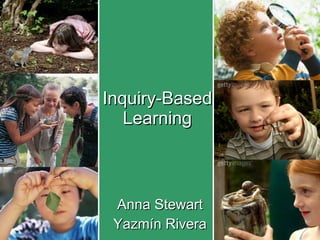
Inquiry based learning[1]
- 1. Inquiry-Based Learning Anna Stewart Yazmín Rivera
- 2. Pedagogical Strategies What is the goal of science education? Inquiry Based Learning
- 5. Learning Cycle Engage Explore Explain Extend Evaluate Inquiry Based Learning
- 6. Inquiry Levels Inquiry Based Learning
- 7. Inquiry Levels Inquiry Based Learning Student Student Student Student Student 5 - open Student Student Student Student Teacher/ Student 4 - guided Student Student Student Teacher Teacher 3 - cookbook Student Student Teacher Teacher Teacher 2 - demo Teacher/ Student Teacher Teacher Teacher Teacher 1 - demo Teacher Teacher Teacher Teacher Teacher 0 Lab outcomes determine applications, implications, or further exploration/ instruction. Supplies answers or conclusions Carries out the procedure Plans the procedure to be used Proposes the problem or issue to be explored Postlab Lab Prelab Inquiry Rating
- 8. Let´s transform a lesson!!!
Notas do Editor
- Intro: use anecdote from Inquiry and the national science standards
- We just had a lesson on density. Is this the best way to teach density? What is the goal of science education? Is it to provide a factual basis or is it to provide skills?
- introduce contents via lecture/readings Next, cookbook labs are used to illustrate and verify the concepts from the readings and/or lecture. Students then complete problems or structured activities to practice the acquisition and/or application of the unit concepts. Finally, the evaluation of the unit is conducted, often based primarily on content acquisition, but process skills may be involved, as well. I prefer the traditional ‘chalk and talk’ method of science teaching. (avg = 2.3) - “I don’t prefer it, but sometimes it is ok and works well.” - “Sometimes lecturing is appropriate as a follow up precursor to inquiry activities-to give context and inherent meaning.” - “I see the advantage of both and am most familiar with the traditional method, but hands-on learning is very beneficial to the learning process.” -“Depend on class.” -“It is sometimes necessary (time constraints).”
- "Inquiry" is defined as "a seeking for truth, information, or knowledge -- seeking information by questioning." “ Inquiry is an approach to learning that involves a process of exploring the natural or material world, that leads to asking questions and making discoveries in the search for new understandings” a method of teaching science where students learn science by using similar methods, attitudes and skills as scientists do when they are conducting scientific research. Students get to act like 'mini-researchers. Progress is assessed by how well students develop experimental and analytical skills rather than how much knowledge they possess
- Engage . In this stage you want to create interest and generate curiosity in the topic of study; raise questions and elicit responses from students that will give you an idea of what they already know. This is also a good opportunity for you to identify misconceptions in students' understanding. During this stage students should be asking questions Explore stage students should be given opportunities to work together without direct instruction from the teacher. You should act as a facilitator helping students to frame questions by asking questions and observing. Using Piaget's theory, this is the time for disequilibrium. Students should be puzzled. This is the opportunity for students to test predictions and hypotheses and/or form new ones, try alternatives and discuss them with peers, record observations and ideas and suspend judgement. Explain , you should encourage students to explain concepts in their own words, ask for evidence and clarification of their explanation, listen critically to one another's explanation and those of the teacher. Students should use observations and recordings in their explanations. At this stage you should provide definitions and explanations using students' previous experiences as a basis for this discussion. Extend/Explore: apply concepts and skills in new (but similar) situations and use formal labels and definitions. Evaluation should take place throughout the learning experience. You should observe students' knowledge and/or skills, application of new concepts and a change in thinking. Students should assess their own learning. Ask open-ended questions and look for answers that use observation, evidence, and previously accepted explanations. Ask questions that would encourage future investigations. Remind what we did for the cartesian diver experiment
- Inquiry-based learning is just another new age fad in science education. (avg = 2.4) “ It does have the flavor of a jump-on the band wagon type thing right now, but it does seem to work really well. Only time will tell if it is a fad.” “ I am not completely sure if this will fade out, but I think in theory the pendulum has gone too far b/c some people feel this is right.”
- emphasis should be placed on the broadening of intellect and development of problem solving and critical thinking skills, rather than simply on the memorization of lessons. Memorizing facts and information is not the most important skill in today's world. Facts change, and information is readily available -- what's needed is an understanding of how to get and make sense of the mass of data.
